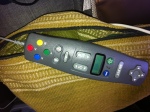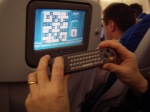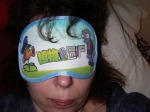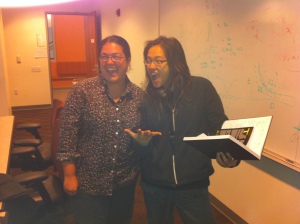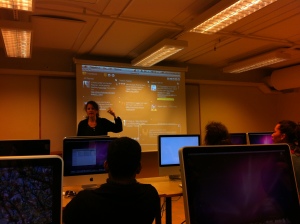Welcome to a week of research on digital aesthetics and culture at the Department of
Arts & Cultural Sciences, Lund University
November 14-17, 2011!
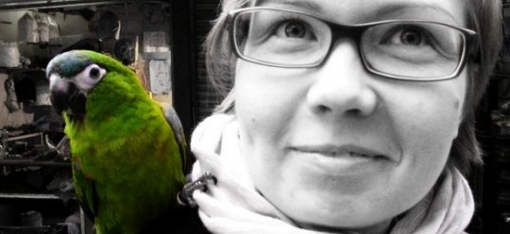
On Monday November 14, Dr Hanna Wirman from HongKong Polytechnic University will give a lecture for all MACA student from Lund and Copenhagen on Virtual Ethnography. Wirman wrote her Ph.D on female computergame players and skinning practices in the game Sims 2. Please contact jessica.enevold@kultur.lu.se for inquiries and details.

On Tuesday, November 15, Dr Olli Leino, from HongKong City University, will give a HEX-lecture at 15.15 on what makes playable artefacts motivating to play. More info in the invitation to the lecture and lab below.


Wirman and Leino will also take part in the international symposium “Playing with Affection” on Game Love Aesthetics and Culture that takes play November 16-17, at the Department of Arts & Cultural Sciences. More on this later. I hereby extend an invitation to the HEX -lecture. A description of HEX and the Digital Cultures and Games Lectures and Lab, and links to previous lectures and conferences, can be found at the end of the invitation.
—
INVITATION TO HEX DIGITAL CULTURES AND GAMES LECTURE AND LAB:
How are computer games experienced as meaningful?
Playability and Experienced Significance.
WHO: Dr. Olli Tapio Leino, City University of Hong Kong.
WHAT: How are computer games experienced as meaningful? Playability and Experienced Significance.
Why are in-game monsters frightening? What is erotic about erotic Tetris? Are the decorative stickers with which the players can decorate their virtual cars in Need for Speed: Undercover (2008) a waste of (in-game) money? In short, how does significance emerge in computer game play? Furthermore, what is the role of technology in this signification, and, how do computer games compare to other forms of new media in this regard? While the answers to these kinds of questions related to interpretation and experience are presupposed by critique and analysis of computer games and other playable new media forms, they are seldom explicated in detail. In this lecture, I discuss the ways in which meaning emerges in interactions with playable media forms. I will discuss also the challenges these forms of signification pose to the paradigmatic methods of interpretation, analysis, and critique of new media.
Conceptualizing computer games through the traditional “game” metaphor has been at the heart of the emerging tradition of game studies for the past decade. Computer games have been described using concepts like “rules”, “winning” and “losing”. In this lecture, however, I argue that for understanding how significance emerges in computer game play, i.e. how and why players find details in computer games meaningful, the game metaphor is slightly problematic. This is because computer game play, more than “traditional” game play, is underpinned by the involvement of technology. Admittedly, computer game play, too, is a human practice, but it is a practice defined by the involvement of technological artefacts rather than rules governing human behavior. These technological artefacts, are not simply at the service of human players like pawns on a Monopoly board, but assume an active role alongside the human subject in co-shaping and transforming the experience of play.
To complement the game metaphor, I identify “playability” as an affordance of a kind of audience engagement characterized by a duality of freedom and responsibility. By introducing themes from existentialism and post-phenomenological philosophy into a game studies framework, I focus on the ways in which playable technological artefacts, like computer games, social media applications and electronic artworks offer themselves to be experienced as significant. Contrasting playability with “playfulness”, considered as a set of aesthetic strategies, constitutes a position from which contemporary computer games and other playable artefacts, and our attempts at making sense of them, can be related to preceding forms of art and culture like participatory and performative art on the one hand, and to the contemporary forms of interactive, perhaps playful but not necessarily playable, art and media on the other. The ensuing lab session, led by Dr. Hanna Wirman and Dr. Olli Leino, we will look at examples that illustrate the themes of the lecture in more detail.
WHEN: Nov 15, 2011. 15 – 18
15.15-16.45 Lecture + Q & A
** small break **
17.00-18.00 Exercises in the computer lab
WHERE: Department of Arts and Cultural Sciences, Lund. Room 109, ground floor, to the left, in Kulturanatomen at Biskopsgatan 7 . The ensuing lab will be held at Biskopsgatan 7, in basement game labs 022 and 019. We’ll lead you there.
HOW: Drop in. It is not mandatory to announce your participation ahead of time, but it is much appreciated! Please email: jessica.enevold@kultur.lu.se
Welcome!
Jessica Enevold
Seminar coordinator HEX Digital Cultures and Games Series
PREVIOUS LECTURES IN THE SERIES:
Dan Pinchbeck – Preserving Digital Games – Immaterial Cultural Heritage
Annette Markham – Remix Ethnography – Digital Material and Virtual Ethnography
Olli Sotama – What Makes Gamers Tick? – On Player Motivation, Production & Consumption
Esther MacCallum-Stewart – The Street Smarts of a Cartoon Princess: Female Avatars, Female Players
Miguel Sicart – Play, Interrupted: On the Ethics of Computer Games
Patrick Williams – What people do in Fantasy Gameworlds and How They Do It: User Interfaces and MMOS
Espen Aarseth – What are Games Anyway? – Introduction, Digital Cultures & Games Lecture Lab Series
CONFERENCES
Folkhälsoinstitutet och Lunds Universitet samarrangemang. 10-11 december, 2010. Spel om pengar och datorspel – Fokus på kvinnor och unga.
[Collaboration with The Swedish National Institute of Public Health; Games and Gambling – Focus on Youth and Women]
Upcoming International Symposium, Nov 16-17, 2011. “Playing with Affection” on Game Love Aesthetics & Culture. Stay tuned for more information.
HEX...
is a cross-disciplinary experimental humanities and social science research platform funded by the Faculty of Humanities and Theology, at Lund University.The aim of the experimental research group, HEX, founded in 2005, is to make possible the organizing and creating of events and products (books, films, installations) that are academically and artistically innovative. HEX serves as a think tank and a breeding ground for new research projects incorporating formats that go beyond the ordinary lecture or publication format; for example, in November 2010, Sweden’s first Science Slam was arranged by HEX – for all activities concult the website:
http://hyphoff.kult.lu.se/hex
The Digital Cultures and Games Lecture and Lab…
is a HEX-funded seminar series that features international scholars of various disciplines well versed in the various fields of digital culture. The seminars consist of a lecture and a hands-on laboratory session in order to illustrate and make concrete what the research lectured on is truly about. The seminar series aims to bring together scholars from a variety of disciplines with the goal of familiarizing a wide culturally interested audience, including scholars, professors as well as students, and laymen to various digital cultures including games. The seminar series is open to all and conducted in English.


